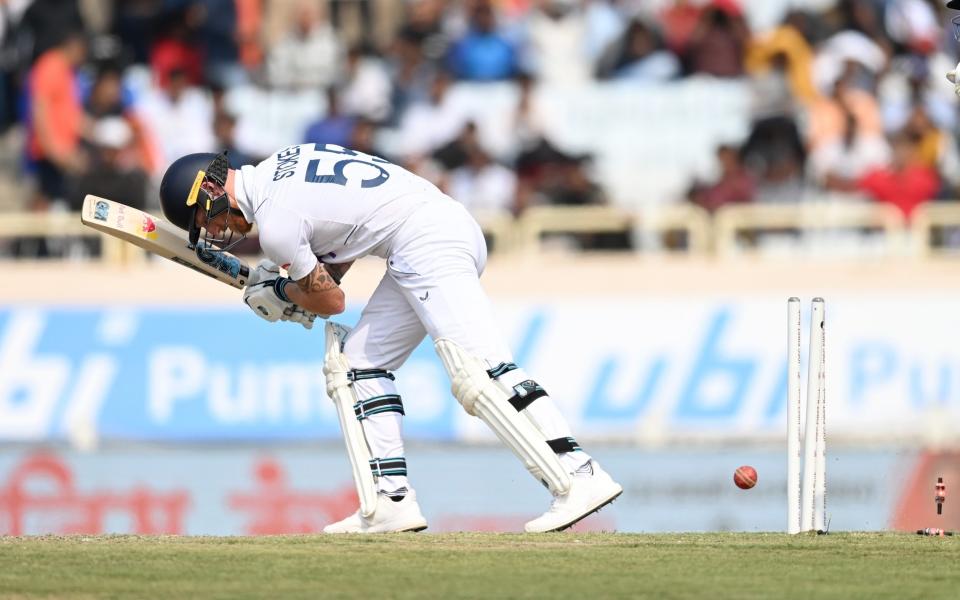
Just as Achilles had his heel, it is the one area of his game – his life? – wherein Ben Stokes is not his positive and proactive self: when he starts a Test innings against spin in India.
In both innings of the fourth Test he was pinned either in or on the popping crease, having barely troubled the scorers. It took to 10 the number of times he has been dismissed for fewer than 10 runs in a Test in India in 26 innings.
It seems strange that the pioneer of Bazball should be so passive. Stokes has struck by far the most sixes in Test cricket, 128, which is 21 more than his brains trust partner, the England coach Brendon McCullum, yet he has become inert when starting against spin. While he has always played himself in before unleashing big shots, which has to be right in all conditions but especially so on a turning pitch in India, England’s captain has been taking this caution to extremes in his footwork and shot-selection.
Stokes has appeared superhuman so often that we have come to expect him to overcome every difficulty or challenge. Not in this series though. He did well enough in the first innings of the first three Tests, scoring 70, 47 and 41 when the ball was not turning so much. In his second innings of this series, in four attempts, he has not passed 15, and it would be no surprise if India’s canny coach Rahul Dravid had suggested to his spinners to pitch the ball ever fuller, as Stokes is so reluctant to push forwards at the outset.
In his brace of cheap dismissals in the fourth Test Stokes was not even the victim of Ravichandran Ashwin. India’s champion finger-spinner has dismissed him 12 times in 16 Tests. Nobody has troubled Stokes so much; and it is relevant that another off-spinner, Australia’s Nathan Lyon, has got him out nine times, equal second most, in 21 Tests.
Overall there is no great disparity: Stokes in Test cricket averages 38 against pace and 34 against spin. But in India, on a turner like the one served up in Ranchi, all the difficulties of starting an innings are exaggerated – especially when you receive a real shocker of a shooter in the opening session, as Stokes did first time round. The batsman to middle that one has yet to be born.
Herein lies an irony. England’s captain has been moving too little in the crease when he has gone in to bat in this series, whereas their vice-captain has been moving too much. Ollie Pope has been going to the opposite extreme of being too pro-active at the start of his innings.
Achilles had a weak heel because when his mother dunked him in the River Styx to make him invulnerable, the part of his body that she held was not covered by miraculous water. In the same way, any examination of the one relative weakness in Stokes’s batting has to focus on his upbringing in Durham.
Durham are radically changing their spin strategy, and were the Division Two champions last season partly as a consequence. They basically did not bother with the stuff, and sometimes the number of wickets they took with spin in a championship season was down to 10 per cent, the lowest of any county. Last season, however, they signed three Test spinners on short assignments, who contributed 45 wickets between them, so that they became the county most aligned to England’s attacking approach: and they are currently playing in Zimbabwe, where their new full-time signing, the left-armer Callum Parkinson, took six wickets in an innings in their last first-class match.
In such an environment as Durham was hitherto, if Stokes when growing up was given less experience in any aspect of batting, it must have been when starting a red-ball innings on a turner against world-class spinners with fielders round the bat. Of course he has improved, enormously, but it was still notable that when he played his first championship innings after being appointed the England Test captain, he played himself in for his first 30 runs against Worcestershire’s seamers, before taking apart their young left-arm spinner Josh Baker when striking him for 6,6,6,6,6 and 4 in one over (his total of 17 sixes being a new championship record).
In Dharamsala, in the foothills of the Himalayas, spin is unlikely to be so dominant as in Ranchi, so the heel is not going to be exposed to the same extent. But still: in the longer term Stokes, knees willing, may have to start several innings in the next Ashes against Nathan Lyon with men round the bat, and he won’t want to be trapped in the crease then.
When Stokes took Baker down for 34 in an over, his shots were not horizontal-bat. He was driving and pull-driving in front of the wicket on the leg-side. But now he has had successful knee surgery, Stokes may feel able to play the sweep earlier in his innings, like Ben Duckett, thereby adding another string to his bow and quiver-full of arrows.
Article courtesy of
Source link